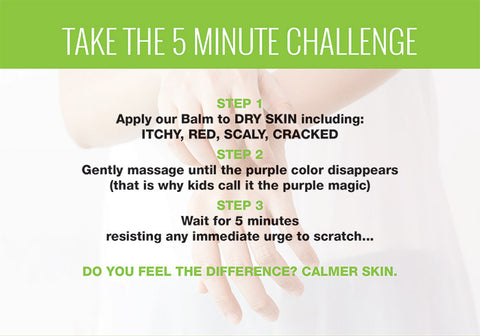
For those of us suffering from eczema, we understand very well that winter months can be the toughest time of year. The dry air, cold temperature, and low humidity make our skin susceptible to eczema breakouts and flares.
Finally, we are in the full summer season. There’s a plenty of sunshine, high humidity and warm temperature. All weather conditions that is ideal for eczema.
So, why am I still breaking out with eczema? Why are my itches more severe than those experienced during the winter months?
There are no clear explanations. However, the following mechanisms have been proposed:
Sweat Triggers Eczema
Hot weather makes everyone sweat more. Sweating is our natural defense mechanism to control the body’s temperature. Sweat consists of mostly water. As water evaporates from the skin surface, it provides a natural cooling sensation and also lowers the body temperature.
In addition to water, there are trace amounts of sodium, potassium, calcium, magnesium, lactic acid, urea, copper, zinc, nickel, iron, chromium and lead in the sweat. Many of these chemicals, if presented at a high enough concentration, may be irritating to the skin. In high humidity, sweat cannot easily evaporate, which can lead to a gradual buildup of these chemicals on the skin.
Too Much Water Leads to Itchy Rash
Edna Ferber, an American novelist, said: “Perhaps too much of everything is as bad as too little.” Excessively dry skin breaks down the skin barrier leading to flares of eczema. However, too much water exposure may be detrimental to eczema.
It is not uncommon to see kids with large amounts of sweat accumulating in skin folds, such as the inner elbows and necks. The pooling of water and chemicals can lead to irritation and trigger eczema flares.
Hot Temperature Worsens Itch
External heat increases the body temperature. To cool off, the body dilates the blood vessels in the skin, which can attract inflammatory cells to the skin at a faster rate. Furthermore, heat also promotes the itch reflex, making the severity of the itch much worse. For that same reason, to suppress and control itch, patients are often advised to apply cold packs over the affected area.
Blockage of Sweat Glands
There are two types of sweat glands in the body that help with the sweating process. These are eccrine and apocrine glands. There are occasions when the opening of these ducts become occluded, especially in hot weather. This can lead to miliaria, a type of rash that commonly occurs on the back and can be itchy.
Summer Exposures That Are Bad for Your Skin
Aside from the weather, there are a number of activities we do only in the summer months that have the potential to worsen your skin.
For example, swimming in a chlorinated pool can wreak havoc on your skin and hair. For one thing, chlorinated water can definitely dry out your skin.
Also, to prevent skin cancer, premature aging, and sunburn, it is a good idea to use sunscreens. Because people with eczema have sensitive skin, some of the UV actives, such as avobenzone and oxybenzone, can lead to an allergic or photoallergic reaction. Photoallergy is defined as a skin reaction triggered by the combination of chemical and light exposure.

6 Tips to Prevent Flares of Eczema
What can you do to prevent flares of eczema during the summer months? Here are some useful tips:
- Maintain a cool and comfortable temperature indoors. The preferred temperature is about 65 degrees Fahrenheit, which is about 18-degree Centigrade.
- Avoid outdoor activities from 10 am to 2 pm, when the sun is most intense. Also, it is usually the hottest time of the day.
- Drink plenty of cold water; stay cool under shade.
- Wipe away any accumulation of sweat with gentle paper wipes or a towel. This prevents pooling of excess sweat, especially in the skin fold, such as the inner elbows and neck. Also, it clears off any chemicals deposited on the skin.
- Consider using physical sunscreens with zinc oxide and titanium dioxide for UV protection.
- Wash thoroughly with gentle soap and water immediately after swimming in a chlorinated pool. Remember to apply moisturizer over the whole body immediately after showering. For the problematic area, such as especially dry and itchy skin area, you can apply Dr. Wang's Herbal Rescue Balm -Total Relief Skin Moisturizer. It is designed especially to break the itchy-scratch cycle and provide long lasting comfort relief.
Do you suffer from eczema during the hot summer months? Or, this is your time of reprieve and solace? Let us know. Also, if you have any other good tips on how to prevent eczema flares, please share them as well.







My eczema gets worse in the summer. I just get so itchy and sweating doesn’t help. My neck is the worst part and I just can’t sleep at night.
I have really bad eczema on my hands and the inside of my elbows and in the heat because of all the sweat it is getting worse and just as it gets better it comes back again it is on of the most annoying things ever!!!!!!!
I suffer badly in the summer months when it’s really hot it gets so itchy I apply diprobase regularly going to doc next week to hopefully get a steroid cream
My eczema is horrible right now! I usually have it on my wrists and inside of my elbows, but this summer I have terrible flare ups all up and down my legs. Even my prescription cream can’t seem to get it under control. So frustrating!
My rash/eczema only appears on one hand and wrist area. It only appears during summer months and disappears during winter months. It doesn’t really itch, but patches are red and often tender to the touch.